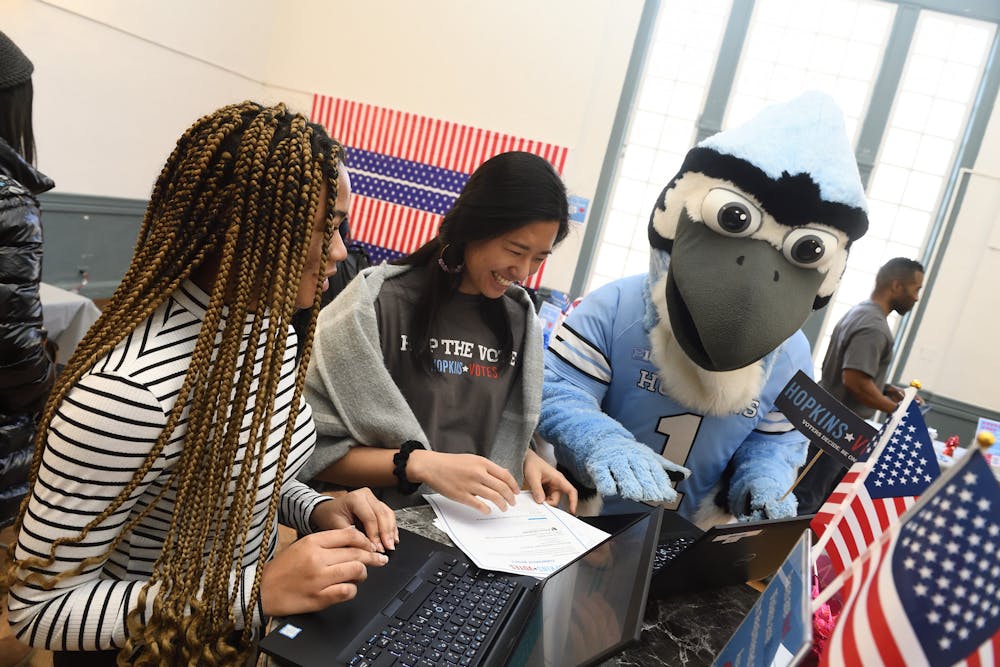The coronavirus (COVID-19) pandemic has changed how many Americans will cast their ballot in the upcoming election. To limit COVID-19’s spread, many states have made mail-in voting more accessible as a safer alternative to voting in-person.
This election is expected to be the largest mail-by-vote election in the history of the United States. Maryland has sent an application to request an absentee ballot to every registered voter in the state. Other states, like California and New Jersey, have automatically sent absentee ballots.
Hopkins Votes has been working to increase voting rates at Hopkins, notably through its Commit to 100 percent campaign that aims to get student organizations to register all of their members to vote. Today is National Voter Registration Day, which is celebrated on the fourth Tuesday of every September.
Junior Reshmi Patel, the events and resources coordinator of Hopkins Votes, stated that she is working to support students as they navigate the democratic process.
“Hopkins Votes is an organization committed to supporting members of the JHU community in their efforts to be civically engaged and participate in the U.S. democratic process,” she said. “We partner with other groups on campus, hold events such as registration drives and absentee ballot parties, and provide informational resources to aid students in registering in their state and voting by whichever method they choose.”
The Student Government Association (SGA) has been organizing voting-related initiatives as well.
Sophomore Class Senator Talia Shadroui, a member of SGA’s Civic Engagement Committee, noted that the group, in partnership with Hopkins Votes, have been working from different angles, such as social media, to increase voter turnout among the student body.
“The committee has been working on a multi-faceted approach to encourage people to vote,” she said. “We are looking for ways to incentivize student groups.”
Given that Election Day — which falls on the Tuesday after the first Monday in November — occurs during the fall semester, many students at Hopkins typically vote with absentee ballots. The pandemic and political debates surrounding absentee ballots, however, have complicated the process.
Sophomore Casey Levitt, who is registered to vote in Maryland, had to request her absentee ballot again after changing addresses from her dorm to an off-campus rowhouse.
“I registered to vote in Baltimore when I moved, but I recently had to change my address from the dorms to my new rowhouse,“ Levitt said. “It wasn’t that hard to change my address, but I did have to use the mail, and with the mail you never know where things are. It’s more unpredictable than doing it online, but in the end all the forms ended up where they needed to go and it all worked out.”
Voting in-person remains as an option for those who feel comfortable going to their polling location.
Sophomore Emi Ochoa, who is registered in Maryland and currently residing off-campus, is one of these students. She plans to visit a polling booth near her house to avoid the uncertainties of mail-in ballots.
“I ordered a mail-in ballot, but it's being really slow, and I think maybe I shouldn’t put pressure on the postal system. Since I, and all of my roommates, are young and healthy, I can afford to go and vote in-person,“ Ochoa said. “I’ll be voting at the polling booth at Barclay Elementary school.”
The National Study of Learning, Voting and Engagement published a report in 2018 about college age voting rates in the 2012 and 2016 general elections.
According to the report, in 2016, only 55.8 percent of eligible Hopkins students voted in the election, which was an increase from 2012 when only 42.5 percent of eligible students voted. Overall, only half of all eligible college-age voters voted in the 2016 general election.
The report also broke down voting rates by field of study within universities. Business, management and marketing majors, as well as communication and journalism majors, had the highest voter turnout with 68.2 percent and 69 percent, respectively. Mathematics and statistics majors only had a 29.8 percent voter rate, while engineering and engineering technologies majors had a 46.9 percent voter rate.
Levitt stated she expects many more students will vote in the upcoming election.
“I’m hoping that, because we are all so active on social media talking about politics, voting and social justice, hopefully there will be higher voter turnout among students,“ she said.
Sophomore Kevin LaMonica, an Ohio voter, avoided any obstacles in requesting an absentee ballot to his off-campus address. However, he expressed concern about the youth vote being suppressed.
“I do think young people will vote because [they] have been so active in the activist space this summer, but I also worry about the number of young people that have to rely on ballots being mailed to them and the number of different issues that could arise during that process,” he said. “Obviously the Trump administration trying to gut the postal service might cause problems as we approach November, but I’m hoping that won’t be the case.”
U.S. President Donald Trump has repeatedly attacked the integrity of absentee voting and threatened to withhold funding from the United States Postal Service (USPS), which handles absentee ballots. Louis DeJoy, the postmaster general who took helm of the USPS in June, also made changes in the operations of the USPS which, according to voting experts, could negatively impact the election.
Shadroui stressed that the outcome of the upcoming election will directly affect college students.
“It’s really important that students are involved and aware of politics and what’s going on,” she said. “So many issues impact college students, and that’s why civic engagement is especially important to me.”
Chris H. Park, the volunteer coordinator of Hopkins Votes, is a News & Features Editor for The News-Letter. He did not contribute reporting, writing or editing to this article.





